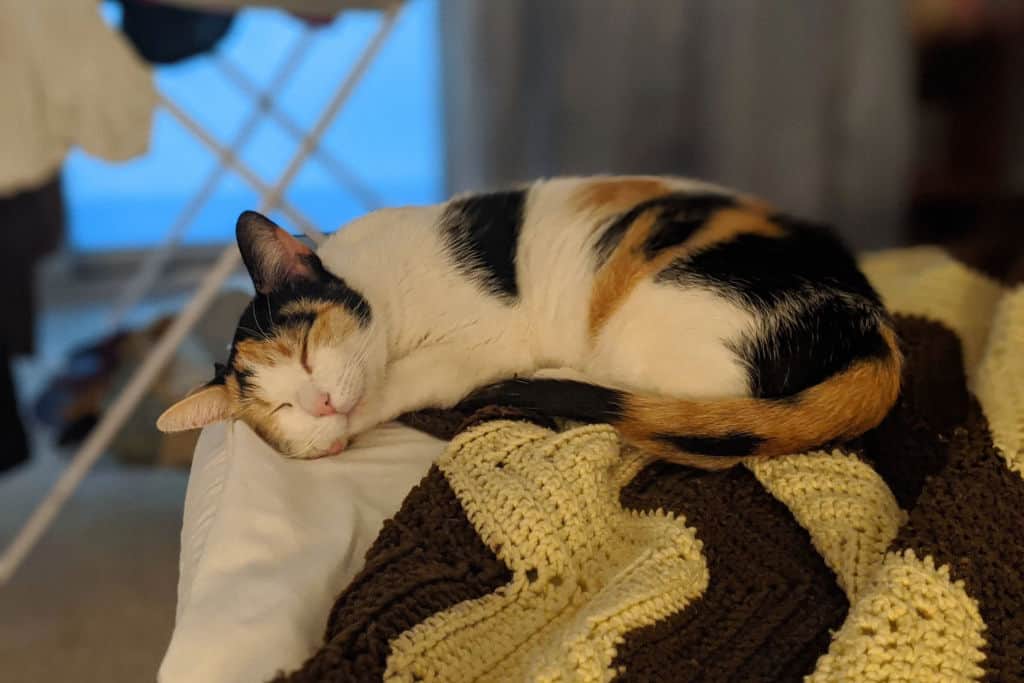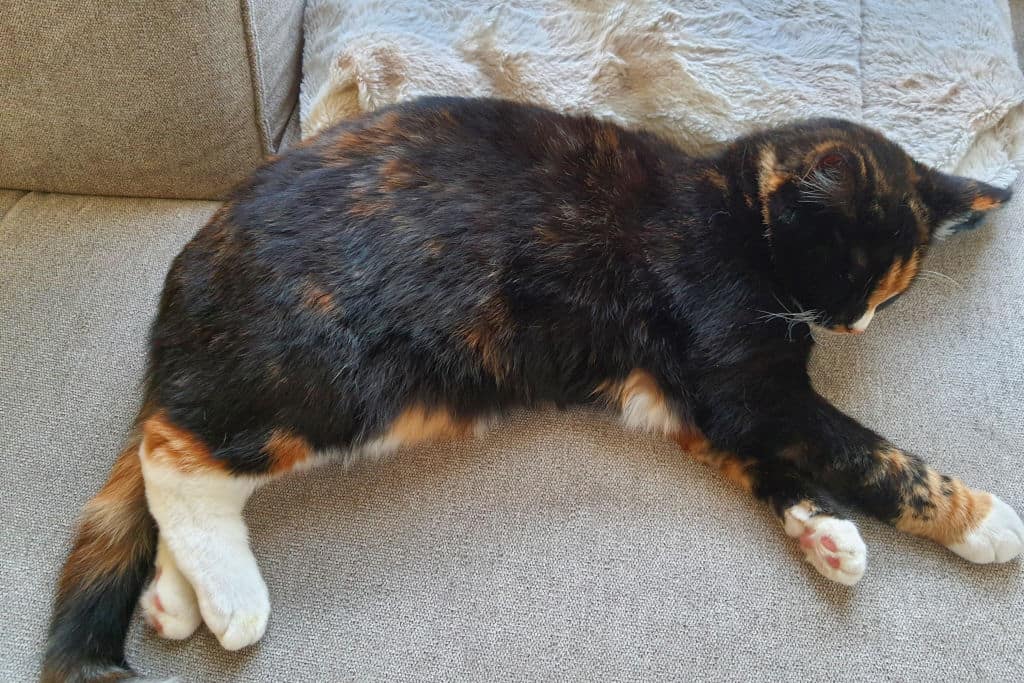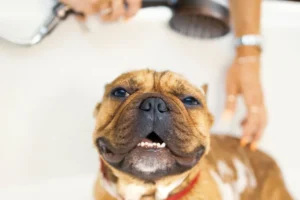Note: We may earn a commission from helpful, relevant links in our content. No cost to you. See our privacy policy.
Are you a cat owner who’s expecting a litter of kittens? If so, you may wonder if bathing your pregnant cat is safe and what the risks are.
In this article, we’ll cover the risks, alternative cleaning methods, and safe bathing techniques to help you keep your pregnant cat healthy and clean.

What are the Risks of Bathing a Pregnant Cat?
In short, the main risks associated with bathing a pregnant cat are:
- Stress and anxiety, which can lead to complications with the pregnancy or even premature labor.
- Stripping natural oils from the cat’s skin and fur, which can lead to dryness and irritation.
- Lowering the cat’s body temperature, which can be dangerous for both the mother and her unborn kittens.
Pregnant cats are generally more prone to stress and anxiety than non-pregnant cats, and the experience of being bathed can make it worse. If a pregnant cat feels stressed or uncomfortable during the bath, it can cause a hormonal response that could trigger premature labor.
Pregnancy can be a time of hormonal changes and stress for cats, sometimes making their skin and fur more sensitive and prone to dryness and irritation. When a cat is bathed, it can strip away the natural oils that help keep the skin and fur healthy, leading to dryness, itchiness, and other skin problems.
When a cat is bathed, the water can cause their body temperature to drop, which can be particularly dangerous for pregnant cats and their unborn kittens. This can lead to complications with the pregnancy and even put the kittens’ lives at risk.
Regular check-ups with your veterinarian can help ensure the optimal health of your pregnant cat, especially if you’re considering bathing her.
How to Keep a Pregnant Cat Clean Without Bathing?
Since bathing a pregnant cat can be risky, there are other methods you can use to keep her clean.
Using a soft brush or comb to groom your pregnant cat can help remove dirt and debris from their coat, keeping them clean and free of tangles. Grooming can also help distribute natural oils throughout their fur, keeping it healthy and shiny.
If your cat has dirty spots, you can use pet wipes or a damp cloth to clean them gently. This can be particularly useful for cleaning around the face and paws.
For stubborn stains, a dab of coconut oil can assist in lifting dirt while also nourishing the skin, just be sure to remove excess oil with a cloth.
It’s important to keep your cat’s living space clean and dry. This means regularly cleaning out their litter box, providing fresh water, and keeping their bedding clean. A clean living space can help prevent unwanted odors and bacteria and keep your cat healthy and comfortable.
Pregnant cats require extra attention and care, so be sure to provide plenty of love, cuddles, and playtime. Keeping your cat’s stress levels low is essential to her overall health and well-being. By providing her with a calm and peaceful environment, you can help ensure a safe and healthy pregnancy.
How to Bathe a Pregnant Cat Safely?
Bathing a pregnant cat should only be done if absolutely necessary, and even then, with extra care and attention.
Before you even think of getting your cat wet, try a dry bath using cornstarch. Just sprinkle a little onto your cat’s coat, rub it in gently, and brush out. It’s an effective method to freshen her up without the risks associated with water.
If you must do it, here are some tips to bathe a pregnant cat safely:
- Use a cat-specific shampoo. Choose a gentle, cat-specific shampoo that is free of harsh chemicals and fragrances. Avoid using human shampoos or soaps, which can be too harsh for a cat’s delicate skin.
- Prepare everything ahead of time. Make sure you have all the necessary supplies, such as towels, shampoo, and a brush, within easy reach before you start the bathing process. This will help minimize any potential stressors and keep the process as smooth as possible.
- Use lukewarm water. Fill a bathtub or sink with lukewarm water that is about chest-high for the cat. Make sure the water is not too hot or cold, as this can be uncomfortable for the cat and potentially dangerous for her unborn kittens.
- Be gentle and patient. Gently wet the cat’s fur and apply a small amount of shampoo, being careful to avoid the face and ears. Use a soft brush or your hands to work the shampoo into a foam, and then rinse thoroughly with lukewarm water.
- Dry the cat off thoroughly. After bathing, wrap the cat in a warm towel and gently pat her dry. Be sure to keep the cat warm and comfortable until she is completely dry, as cats are more susceptible to cold when they are wet.
Remember, it is always best to avoid bathing a pregnant cat if possible. Only do it when absolutely necessary and only after consulting with a veterinarian to ensure that it is safe to do so.
And if you suspect your cat is may have worms, it’s important to take extra precautions and learn how to tell the difference, and what to do to.

How to Safely Get Rid of Fleas on a Pregnant Cat?
One option is to use a flea comb to physically remove fleas and their eggs from the cat’s fur. Be sure to use a comb with fine teeth, and comb in the direction of the fur to avoid irritating the cat’s skin. This can be a time-consuming process, but it can be effective in removing a large number of fleas.
Another option is to use a flea treatment that is safe for use on pregnant cats. Several options are available, including topical treatments (Revolution, Frontline, etc.) and oral medications (Capstar, Comfortis, etc.). Your veterinarian can recommend the best option for your cat based on her age, weight, and overall health.
It’s important to follow the instructions for flea treatment carefully and use only the recommended amount. Overuse of flea treatments can be harmful to both the mother and her unborn kittens.
Take measures to control their population in your home as well. Vacuum frequently, particularly in areas where your cat spends a lot of time, to remove fleas and their eggs from your carpets and upholstery.
In addition to treating your cat, treating your home and yard is important to get rid of fleas. Use a flea spray or fogger designed in homes (such as the Vet’s Best Flea spray), and treat your yard with a flea repellent.
To prevent fleas from infesting your cat’s bedding and toys, wash them frequently in hot water to kill fleas and their eggs. Check our guide on cat flea prevention and treatment.
Some Other Things a Pregnant Cat Should Avoid
During pregnancy, it’s important to take extra care of your cat during pregnancy and ensure she stays healthy and comfortable. Here are some other things that pregnant cats should avoid:
- Exposure to chemicals such as cleaning products, pesticides, and fertilizers, as they can be harmful to both the mother and her unborn kittens.
- Some medications, including non-steroidal anti-inflammatory drugs (NSAIDs), should not be given to pregnant cats as they can cause complications with the pregnancy or harm the developing kittens.
- Avoid giving raw or undercooked meat. Pregnant cats are more susceptible to bacterial infections, and raw meat can increase the risk.
- Handle their litter box with caution. Pregnant cats are more susceptible to toxoplasmosis, so take extra precautions when handling their litter box to avoid the risk of infection. Wearing gloves and a mask and washing hands thoroughly can help prevent the transfer of Toxoplasma gondii to pregnant women and other people who may have weakened immune systems. An alternative to a litter box is a shallow tray with shredded paper or old towels.
It’s important to keep your pregnant cat safe and healthy by avoiding these things and providing her with proper care and attention throughout her pregnancy. If you’re wondering about the best age for a cat to have kittens, check out our recent post.
FAQs
Is it advisable to pick up a pregnant cat?
It’s generally advisable to avoid picking up a pregnant cat unless it’s necessary, as it can cause stress and discomfort. If you need to pick up a pregnant cat, be sure to support her weight and lift her gently, taking care not to apply pressure to her belly.
Can fleas survive in cat litter?
Fleas can potentially survive in cat litter, as they can lay eggs and reproduce in a warm and humid environment. To prevent fleas from infesting your cat’s litter box, try to keep the litter box clean and dry, and use a litter that is specifically designed to repel fleas, but make sure it’s safe first.
Are fleas harmful to newborn kittens?
Fleas can be harmful to newborn kittens, as they can cause anemia and transmit diseases. It’s important to keep the mother and her kittens flea-free.
Are belly rubs beneficial for pregnant cats?
Belly rubs can be beneficial for pregnant cats, as they can help to relieve stress and provide comfort. However, try to be gentle and not put too much pressure on the abdomen.
Alex, a passionate animal lover, has experience in training and understanding animal behavior. As a proud pet parent to two dogs and three cats, he founded AnimalReport.net to share insights from animal experts and expand his knowledge of the animal kingdom.








